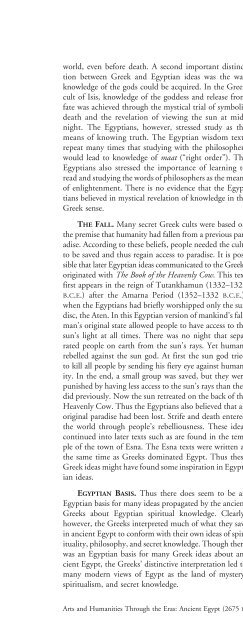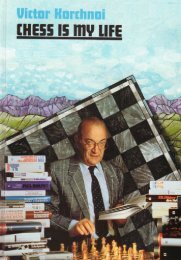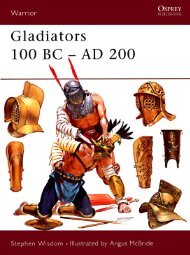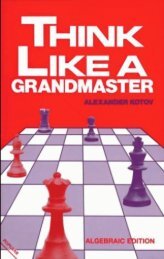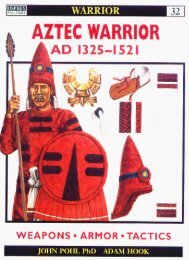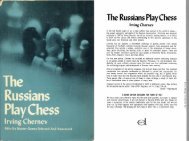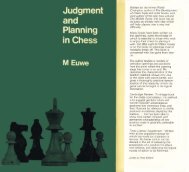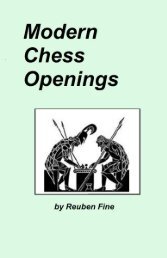Through the Eras
Edward Bleiberg ed., Ancient Egypt (2675-332 ... - The Fellowship
Edward Bleiberg ed., Ancient Egypt (2675-332 ... - The Fellowship
Create successful ePaper yourself
Turn your PDF publications into a flip-book with our unique Google optimized e-Paper software.
Philosophyworld, even before death. A second important distinctionbetween Greek and Egyptian ideas was <strong>the</strong> wayknowledge of <strong>the</strong> gods could be acquired. In <strong>the</strong> Greekcult of Isis, knowledge of <strong>the</strong> goddess and release fromfate was achieved through <strong>the</strong> mystical trial of symbolicdeath and <strong>the</strong> revelation of viewing <strong>the</strong> sun at midnight.The Egyptians, however, stressed study as <strong>the</strong>means of knowing truth. The Egyptian wisdom textsrepeat many times that studying with <strong>the</strong> philosopherswould lead to knowledge of maat (“right order”). TheEgyptians also stressed <strong>the</strong> importance of learning toread and studying <strong>the</strong> words of philosophers as <strong>the</strong> meansof enlightenment. There is no evidence that <strong>the</strong> Egyptiansbelieved in mystical revelation of knowledge in <strong>the</strong>Greek sense.THE FALL. Many secret Greek cults were based on<strong>the</strong> premise that humanity had fallen from a previous paradise.According to <strong>the</strong>se beliefs, people needed <strong>the</strong> cultsto be saved and thus regain access to paradise. It is possiblethat later Egyptian ideas communicated to <strong>the</strong> Greeksoriginated with The Book of <strong>the</strong> Heavenly Cow. This textfirst appears in <strong>the</strong> reign of Tutankhamun (1332–1322B.C.E.) after <strong>the</strong> Amarna Period (1352–1332 B.C.E.),when <strong>the</strong> Egyptians had briefly worshipped only <strong>the</strong> sundisc, <strong>the</strong> Aten. In this Egyptian version of mankind’s fall,man’s original state allowed people to have access to <strong>the</strong>sun’s light at all times. There was no night that separatedpeople on earth from <strong>the</strong> sun’s rays. Yet humansrebelled against <strong>the</strong> sun god. At first <strong>the</strong> sun god triedto kill all people by sending his fiery eye against humanity.In <strong>the</strong> end, a small group was saved, but <strong>the</strong>y werepunished by having less access to <strong>the</strong> sun’s rays than <strong>the</strong>ydid previously. Now <strong>the</strong> sun retreated on <strong>the</strong> back of <strong>the</strong>Heavenly Cow. Thus <strong>the</strong> Egyptians also believed that anoriginal paradise had been lost. Strife and death entered<strong>the</strong> world through people’s rebelliousness. These ideascontinued into later texts such as are found in <strong>the</strong> templeof <strong>the</strong> town of Esna. The Esna texts were written at<strong>the</strong> same time as Greeks dominated Egypt. Thus <strong>the</strong>seGreek ideas might have found some inspiration in Egyptianideas.EGYPTIAN BASIS. Thus <strong>the</strong>re does seem to be anEgyptian basis for many ideas propagated by <strong>the</strong> ancientGreeks about Egyptian spiritual knowledge. Clearly,however, <strong>the</strong> Greeks interpreted much of what <strong>the</strong>y sawin ancient Egypt to conform with <strong>the</strong>ir own ideas of spirituality,philosophy, and secret knowledge. Though <strong>the</strong>rewas an Egyptian basis for many Greek ideas about ancientEgypt, <strong>the</strong> Greeks’ distinctive interpretation led tomany modern views of Egypt as <strong>the</strong> land of mystery,spiritualism, and secret knowledge.HERODOTUS:Prime SourceHerodotus was a Greek historian who lived in<strong>the</strong> fifth century B.C.E. His nine-book exploration of<strong>the</strong> causes of <strong>the</strong> war between Persia and Greece in<strong>the</strong> fifth century led him to write about Egypt and itsrole in <strong>the</strong> Persian Empire. His study of Egypt is broad,investigating <strong>the</strong> antiquity of Egyptian civilization, <strong>the</strong>geography of Egypt, <strong>the</strong> Nile and its behavior, andEgyptian manners and customs, especially religion.Herodotus took a special interest in anything he foundto be astonishing about Egyptian culture. For example,he expressed his wonder at <strong>the</strong> Egyptians’ architecturalachievements, describing buildings that modernpeople also found to be marvels, such as <strong>the</strong> pyramids.Yet he claims that King Khufu financed <strong>the</strong> buildingof <strong>the</strong> pyramids through his daughter’s acts of prostitution,a ra<strong>the</strong>r astonishing assertion. He also stressedEgypt’s invention of some aspect of culture, especiallywhen he thought that <strong>the</strong> Egyptians had inventedsome aspect of Greek culture. He assumed that anything<strong>the</strong> Egyptians invented that resembled Greekculture began first in Egypt, and <strong>the</strong>n traveled toGreece. His work was repeated by Greek and <strong>the</strong>nRoman writers for centuries, leading to many falseideas about Egypt and its relationship to <strong>the</strong> classicalGreek and Roman world. Perhaps <strong>the</strong> most importantof <strong>the</strong>se ideas was his equation of Egyptian and Greekdeities. Herodotus was <strong>the</strong> first to equate <strong>the</strong> Egyptiangod of writing, Thoth, with <strong>the</strong> Greek god Hermes.This equation eventually led to <strong>the</strong> Greek creationHermes Trismegistus or Thrice Great Hermes, a mythicalfigure that <strong>the</strong> Greeks credited with <strong>the</strong> inventionof astrology and alchemy, and <strong>the</strong> Egyptians creditedwith <strong>the</strong> invention of writing. Out of <strong>the</strong>se ideas grew<strong>the</strong> false impression that hieroglyphs were symbolsof philosophical ideas ra<strong>the</strong>r than representations ofordinary language like o<strong>the</strong>r writing systems. Thisidea resulted in centuries of misunderstanding untilJ.-F. Champollion deciphered hieroglyphs in 1822.The Greek vision of <strong>the</strong> Egyptians allowed manycommentators who followed to invent <strong>the</strong>ories about<strong>the</strong> Egyptians with no basis in empirical reality.SOURCESJan Assmann, Egyptian Solar Religion in <strong>the</strong> New Kingdom(New York: Kegan Paul International, 1995).Erik Hornung, The Secret Lore of Egypt: Its Impact on <strong>the</strong>West (Ithica, N.Y.: Cornell University Press, 2001).SEE ALSO Literature: Egyptian Writing and LanguageArts and Humanities <strong>Through</strong> <strong>the</strong> <strong>Eras</strong>: Ancient Egypt (2675 B.C.E.–332 B.C.E.) 197


